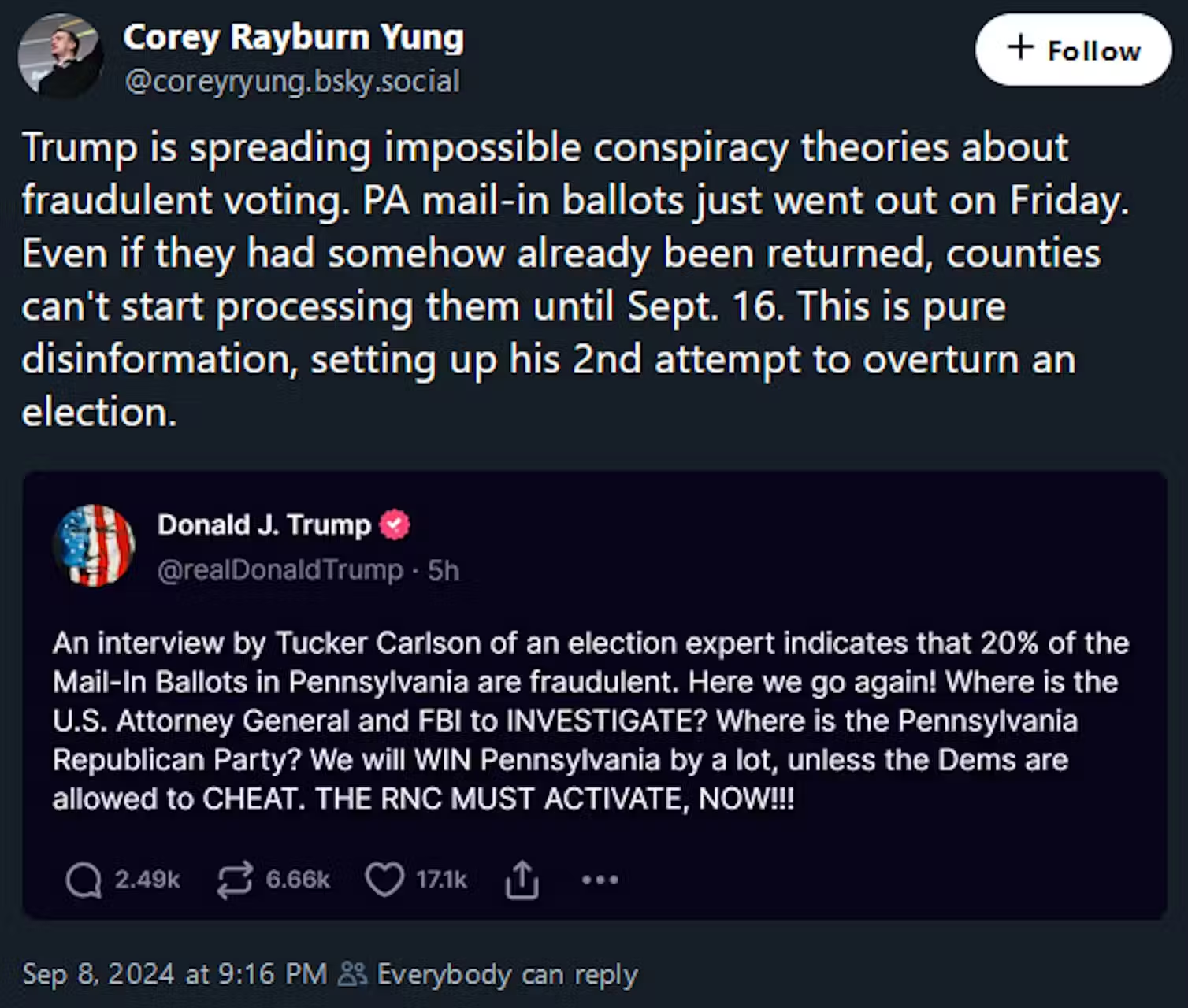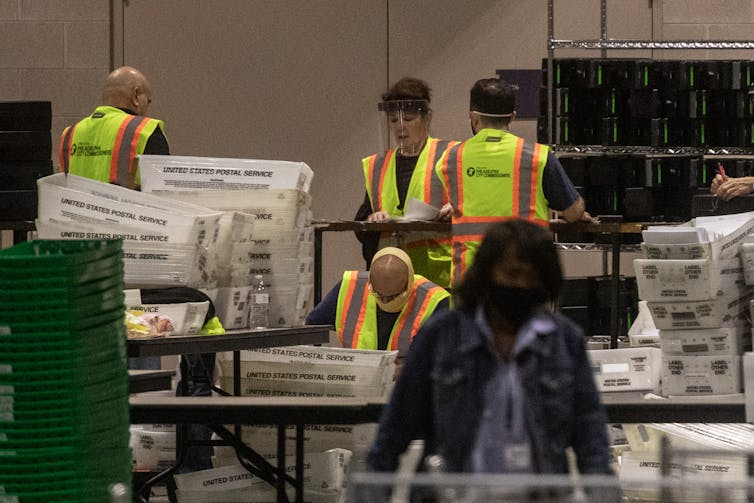This article is part of TPM Cafe, TPM’s home for opinion and news analysis. It was originally published at The Conversation.
Mail-in voting in Pennsylvania will not begin on Sept. 16, 2024, as was previously slated. Due to ongoing court cases, the past is poised to repeat itself in the commonwealth in the upcoming presidential election.
Legal battles over Pennsylvania’s election system drew national attention in 2020 as former President Donald Trump and his allies in the state leveraged quirks of the system to sow doubt about the results of the election.
Trump is setting the stage to do the same in 2024. On Sept. 8, 2024, he posted to Truth Social declaring that a Tucker Carlson interview revealed that “20% of the Mail-in Ballots in Pennsylvania are fraudulent.” He called for the U.S. attorney general, the FBI and Pennsylvania Republicans to do something about it.

Given the decentralized nature of elections administration in the United States, every state — and even county — has its own rules for ballot counting and voting.
As an associate professor of public policy who closely follows Pennsylvania politics, I have been watching the situation with mail-in ballots over the past four years. Here’s why I expect the same problems to rear their heads again this November.
Act 77
For much of its history, Pennsylvania allowed mail-in absentee voting for only a very specific set of voters, such as those traveling out of state on Election Day.
In 2019, Democratic Gov. Tom Wolf and the Republican-controlled General Assembly passed Act 77, which made wide-ranging reforms to the state’s election system.
Each party got something big.
Democrats got no-excuse, mail-in voting, meaning anyone can request to vote by mail. Mail-in voting has been used far more by Democratic than Republican voters in Pennsylvania, though this has been driven in part by misinformation surrounding the security of mail voting.
Republicans, meanwhile, got rid of straight-ticket voting that had hurt them in down-ballot races. Straight-ticket voting is when voters are able to pick an entire slate of Democrats or Republicans with just one mark rather than having to vote in every single race.
COVID and the 2020 election
No-excuse, mail-in voting in Pennsylvania was road tested amid a global pandemic.
During the Pennsylvania primary in June 2020, there were significant delays in processing a surge of mail-in ballots. For context, only 4% of votes cast in Pennsylvania in the 2016 presidential election — before Act 77 — were sent by mail. That share ballooned to 39% in the 2020 election.
Of course, the increase was not driven solely by Act 77 but also the COVID-19 pandemic. Mail voting was popular because it allowed people to vote from their homes without risking possible exposure to the virus. Alarm bells sounded among county officials, though, when some Pennsylvania counties took more than a week to finish their counts and certify results in the primary.
Over the summer of 2020, experts began to talk of a “red mirage” or “blue shift” in states such as Pennsylvania. The expressions describe the phenomenon when in-person votes counted on Election Day favor Republicans but then Democrats take the lead in the days after as mail-in votes, which tend to favor Democrats, are counted.
Trump claimed that such a phenomenon was evidence of a “stolen election.”
PA prohibits ballot preprocessing
One reason it is so easy to contest election results in Pennsylvania is that the state is among the very few — others include Alabama, Mississippi and North Dakota — that do not allow preprocessing of mail-in ballots.
Preprocessing refers to removing mail ballots from their envelopes, checking whether the ballots are valid, flattening them and setting them aside to be counted on Election Day.
The process sounds simple, but it is time-consuming when done tens of thousands of times by county election officials.
Some states, such as Oregon, allow election workers to start this process right away, as ballots come in. Others, such as Arkansas, allow preprocessing to start only five to seven days before Election Day. Some states also allow voters to “cure,” or fix minor mistakes on their ballots — such as a missed signature or other field — if election officials spot an error.
Pennsylvania, however, does not allow ballot processing to start until 7 a.m. on Election Day, when polls open. This is a major reason for the significant delays in counting ballots in the state.
And it is a quirk that Trump and his allies exploited in 2020 to cast doubt on the results.
Problem not fixed
The warning of delays in the 2020 primary and growing rhetoric from Trump around a stolen election almost pushed the Pennsylvania General Assembly to fix the problem in September 2020. However, a deal fell apart over other proposed changes such as banning ballot drop boxes.
House Democrats have attempted to pass a stand-alone preprocessing bill, including one earlier this year. It would allow counties to begin processing – but not counting – ballots seven days before Election Day.
But the fallout of the 2020 election seems to have poisoned the well on election law compromise, even when it comes to preprocessing, which is widely supported by election experts and does not confer a particular advantage to either party. Also, not all counties want to preprocess. For example, less populated counties do not want to use the extra personnel and financial resources, as it doesn’t save them much time.

What to expect
While Sept. 16 is the first date that counties in Pennsylvania must begin processing mail-in voting applications, multiple court cases surrounding the commonwealth’s ballot and when and how they should be counted are still pending.
This means that while Pennsylvanians will have their applications processed in September, they likely will not receive a mail-in ballot until October.
Meanwhile, the General Assembly is unlikely to change rules against preprocessing before the 2024 election.
Mail-in voting has not faded with the pandemic. During the 2022 midterm election, 1.4 million Pennsylvanians requested to vote by mail. Given voter turnout is much higher during presidential election years, Pennsylvania can expect that number to rise in 2024.
Pennsylvania has redesigned its mail-in ballot, which has resulted in fewer rejected ballots. Still, the Trump campaign is already working to exploit technicalities to reject mail-in ballots in the crucial swing state.
Ongoing lawsuits on top of ballot-counting delays may well delay certification of the commonwealth’s results in November. Given its emerging status as the must-win state in the 2024 election, Pennsylvania will once again have the eyes of the nation on its election system.
This article is republished from The Conversation under a Creative Commons license. Read the original article.







So when does Rudy book Four Seasons Landscaping for the Big Steal '24 Press Conference?
If Trump loses Pennsylvania, it’s almost guaranteed that he loses the election. We should expect all kinds of efforts by the Trump campaign and Republicans to interfere with the vote there, both through lawsuits and the usual efforts of flyers and messages stating things like “Democrats can only vote on Wed. Nov 6th” in an effort to suppress Democratic turnout. I would not be surprised if there was a focus on using “vote watchers” to try to intimidate voters in Democratic areas, threatening violence is right up their alley. I also would not be surprised by lawsuits to stop the vote counts at midnight on election day, or throw out every mail in ballot as fraudulent, and other efforts to try to find a friendly judge to gum up the works long enough that Trump can declare the whole thing a cheat and that he won.
The plan is to make the election as fraught as possible so Republicans can declare “victory” in the press and force the system to go along with them. It will be uglier than the 2020 process (not including Jan 6th), and it’s unknown whether we’ll face another bout of violence like Jan 6th, possibly spread among the swing states where there’s a close result and counting happening in some Democratic city…if someone realizes that torching a vote counting center in Atlanta, Philly, Detroit, or similar could flip the election we might see that attempted.
I have no hope we won’t get through this cycle without violence of some kind, and little hope that things will settle down after the next president is sworn in. If Trump manages to win, he’ll attempt to turn us into a dictatorship, and that’s going to be met with huge protests that will probably face off against the military Trump has said he’ll deploy using the Insurrection Act. If Harris wins, it’s going to be the reaction to Obama on steroids, with claims about a fraudulent election heaped on top. It seems like we’re going to be cursed like this until the MAGA movement loses long or badly enough to fall out of favor with Republicans, and that may take a long while.
Better do it soon. I hear they book up fast.
I was extremely disappointed in the PA Supreme Court decision. The Commonwealth Court’s decision to have the Counties’ voter services departments accept and count ballots even if the ballot had 2042 written on the outer envelope was a good decision, but the PA Supremes’ just reversed that decision.
The outer envelope is superfluous to the returned ballot inside. We PA voters can only get mail-in ballots from our County voter services departments, and have to be returned by 8PM on election day, so it shouldn’t matter what date is on the outer envelope.
Trump and his goons are sure to contest any ballots with dates that are scribbled, or just wrong. It will be interesting, so PA’s final vote tally may be days or weeks out from election day, especially with a close vote.
I’m hoping Harris / Walz win by several hundred thousand votes, negating any effect that challenges to this silly outer envelope date issue.
Thanks for the reminder. I have a retaining wall that needs repair and some new trees that need to be planted in my yard.